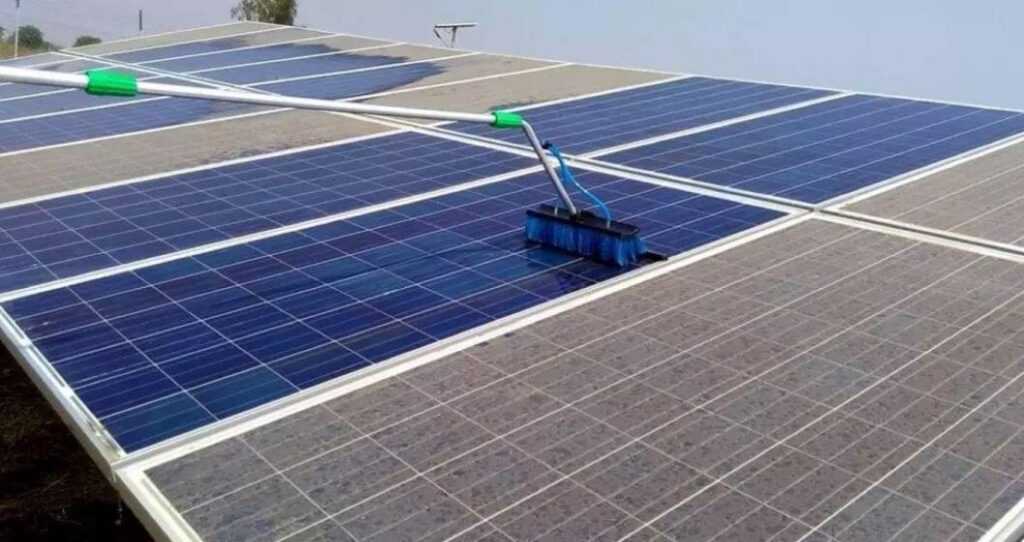Batteries For Solar Systems
Incorporating solar batteries into your solar power system can significantly enhance its capabilities, benefiting seasoned and novice users.
These batteries can store any excess energy generated by your solar panels, thus boosting your setup’s overall efficiency and usefulness.
Solar batteries can substantially impact if you’re in the early stages of considering a solar power system or have already installed one.
Our all-encompassing guide to solar batteries aims to address any inquiries and assist you in selecting the ideal option for your home or business.
Types Of Solar Batteries
The utilization of solar batteries holds significant promise as a feasible means to bolster energy supply to the grid, offering homeowners and businesses the possibility of reduced reliance on the grid and more excellent protection against power outages.
An added advantage of solar batteries is the potential to achieve complete independence from the grid. In the following paragraphs, we will explore the various types of solar batteries available today.
Solar Gel Battery
AGM and GEL deep-cycle batteries are ideal for those seeking reliable energy storage solutions in harsh outdoor environments or extreme climates.
Compared to AGM batteries, GEL deep-cycle batteries have a more tightly packed structure that prevents ions from clogging the pores. This results in superior longevity and performance, making GEL batteries a preferred option for solar applications.
The colloidal-sealed lead-acid batteries in GEL deep-cycle batteries also provide a more extensive internal group, ensuring consistent and efficient energy flow.
Deep-Cycle Battery
Deep-cycle batteries are a unique type of lead-acid batteries that offer exceptional performance compared to their counterparts.
These batteries are designed to retain their energy reserve until they reach 80% or more of their capacity, providing a reliable and consistent power source for an extended period.
This is in marked contrast to starter batteries, which are only capable of delivering short bursts of energy and usually require frequent recharging, discharging 2-5% at each cycle.
Therefore, deep-cycle batteries are ideal for your energy needs if you require sustained power over an extended period.
Saltwater Battery
Sodium ions in table salt have the unique ability to conduct and store electrical energy in saline water.
This innovative technology has led to the development of saltwater batteries, which serve as a highly effective energy storage solution.
Various electrical appliances can utilize the captured energy for later use, making saltwater batteries an ideal choice for sustainable energy storage.
Lithium-ion Battery
Lithium-ion batteries are a versatile energy storage solution that harnesses the reversible reduction of lithium ions.
These batteries have gained widespread popularity and are utilized in various applications, including consumer electronics, electric vehicles, grid-scale energy storage, and military equipment.
In addition, lithium solar batteries stand out as a highly effective and reliable rechargeable energy storage solution for storing excess solar power generated by solar energy systems. With their impressive efficiency and capacity, lithium solar batteries are a promising technology that could revolutionize the renewable energy sector.
Flooded Lead-Acid Battery
Despite their lower energy density, lead-acid batteries have been a trusted and economical option for automotive and industrial needs for many years. This has led to them becoming one of the most widely utilized types of batteries.
These batteries come in two forms: flooded and sealed. Depending on the application and the necessary discharge depth, two-cycle types are available – shallow and deep.
The electrolytes in flooded cells must be periodically replenished with distilled water to avoid gas buildup during charging.
A commonly used example of a flooded lead-acid cell is the 12-V automotive battery.
Nickel-Cadmium Battery
Nickel-cadmium batteries are known for their excellent durability and reliable performance in extreme temperatures, making them a popular choice in the airline and industrial sectors.
Another advantage of these batteries is that they require minimal maintenance compared to other alternatives. However, it is crucial to handle cadmium cautiously as it is a hazardous element that can negatively impact the environment if not managed properly.
Lithium-Polymer Battery
Lithium-polymer batteries are distinct from conventional battery systems primarily due to their utilization of a unique electrolyte. These batteries incorporate a solid polymer electrolyte, which resembles a thin plastic film and is non-conductive yet facilitates ion exchange.
This design feature has resulted in notable safety enhancements, such as heightened resistance to overcharging and a diminished likelihood of electrolyte leakage.
Sealed Lead-Acid Battery
Lead-acid batteries are commonly composed of a housing that contains an electrolyte solution.
It is equipped with a vent or valve to release any accumulated gases to prevent pressure build-up within the battery. During charging, the positive electrodes produce oxygen.
In the case of sealed lead-acid batteries, oxygen recombination cycles are utilized to capture and recombine the generated oxygen. This process is efficient at lower charging rates, but if the charging rate surpasses a certain threshold, a case rupture or thermal run is possible.

How To Choose The Best Solar Battery
Before selecting a solar battery for your setup, it is crucial to analyze your power consumption needs, carefully review the system’s safety features, and consider the setup’s overall cost.
These factors are critical in determining the most suitable solar battery to meet your specific requirements.
Therefore, it is essential to thoroughly evaluate these aspects to ensure that you make an informed decision and achieve the best possible outcome for your solar power system.
Battery Cost
The cost of setting up a solar battery or battery system is influenced by the type and size chosen. Consumers can choose between lead-acid or lithium-ion batteries. Usually, lead-acid batteries are more affordable than lithium-ion batteries. Nevertheless, the intended purpose and use of the battery system may necessitate investing in a lithium-ion battery for long-term cost-effectiveness..
Battery Size
The battery boasting a universal fit has gained recognition as an optimal choice for many buyers needing the technical know-how to make a more tailored selection.
Nevertheless, this all-encompassing approach may sacrifice specific capabilities and functionalities to meet the diverse needs of different applications.
Manufacturer Warranty
Solar battery manufacturers provide a warranty for a predetermined number of charge-discharge cycles or service life duration. As the battery ages, its performance may decrease.
Therefore, manufacturers typically warrant a specific portion of the battery’s capacity to remain intact throughout its guaranteed lifespan.
It is important to note that over time, the battery’s capacity may diminish, but it should still function within the parameters set by the manufacturer during its expected lifespan.
Battery Life
The lifespan of a battery is subject to several determining factors, including but not limited to its age, model, quality, and level of depletion.
These elements collectively impact the overall endurance and longevity of the battery, ultimately influencing its ability to hold a charge and maintain functionality over time.
Battery Capacity
The capacity of a battery is typically measured in amp-hours or amps, which can indicate its overall power. It is essential to bear in mind, however, that achieving the total capacity may require multiple charging cycles.
Therefore, relying solely on the indicated power rating during battery testing may only sometimes be wise.
This is particularly important when selecting a battery for solar energy, as the right choice can significantly impact performance.
To make an informed decision, it is imperative to understand your power needs and estimate the peak power requirements using amp-hours as a helpful guide.
For instance, a battery rated at 100 amp-hours can supply 1 ampere of electric energy for 100 hours or 10 amperes for 10 hours. Considering such factors, you can choose a suitable battery that aligns with your energy needs and expectations.
Power Rating
The power capacity of a battery is determined by its kilowatts (kW) output. This measurement represents the energy the battery can provide at once and is crucial in determining the devices it can support.
Appliances are typically rated in kilowatts or amps, with each one having its power requirements.
It’s important to note that solar batteries often have two different power levels: a steady power rating and a quick power rating that lasts for five minutes.
This design allows them to generate greater power in short bursts, particularly when powering devices such as sump pumps require significant power.
Choosing the Right Solar Battery
Comparing various solar battery systems can be daunting due to the multiple characteristics and technical specifications.
It is understandable, as the home energy storage sector is relatively new, and it may take a lot of work to find someone familiar with battery technology to consult.
Given the numerous options available, selecting the appropriate solar battery that fits your power consumption can be overwhelming.
It is crucial to consider critical factors such as your energy demands, financial constraints, and the scale of your solar setup while deciding on a battery.
Collaborating with a trustworthy solar specialist like Charlie Sparks can significantly aid you in making the right decision. We possess the expertise and knowledge to assess your requirements and suggest the ideal solution.
Frequently Asked Questions
Lithium-ion batteries exhibit exceptional durability and efficiency throughout their lifespan, surpassing other types of batteries in terms of longevity and overall performance.
The typical lifespan of a home solar battery unit can range from 5 to 15 years. A replacement of the battery unit will likely be necessary to maintain a smooth and efficient operation of your solar power system over its expected lifespan of 20-30 years.
Therefore, it is imperative to keep track of the age of your solar battery unit to ensure that it is functioning optimally and to plan for a replacement when necessary.
As sunlight falls on the solar panels, they absorb the energy and convert it into direct current (DC) electricity.
This clean and sustainable energy source is then transmitted to a battery stored for later use. The DC electricity is discharged from the battery when needed and transformed into alternating current (AC) electricity through an inverter.
This process makes the electricity suitable for powering various household appliances and devices. Harnessing solar energy in this manner provides an eco-friendly solution for powering homes and reducing reliance on traditional energy sources.
Solar panels must be connected in series or parallel to regulate the electrical current and voltage to ensure that they function at their optimal capacity. Typically, these panels generate an output terminal voltage of 17 volts, but to meet the specific requirements of battery charging, a regulator can adjust this voltage range to be between 13 and 15 volts.
This regulation process ensures that solar panels generate the right amount of electricity for their intended applications and helps them operate efficiently.
Our ability to provide the necessary information depends on many factors and specifications. For a more comprehensive understanding of these details, please don’t hesitate to contact us.




